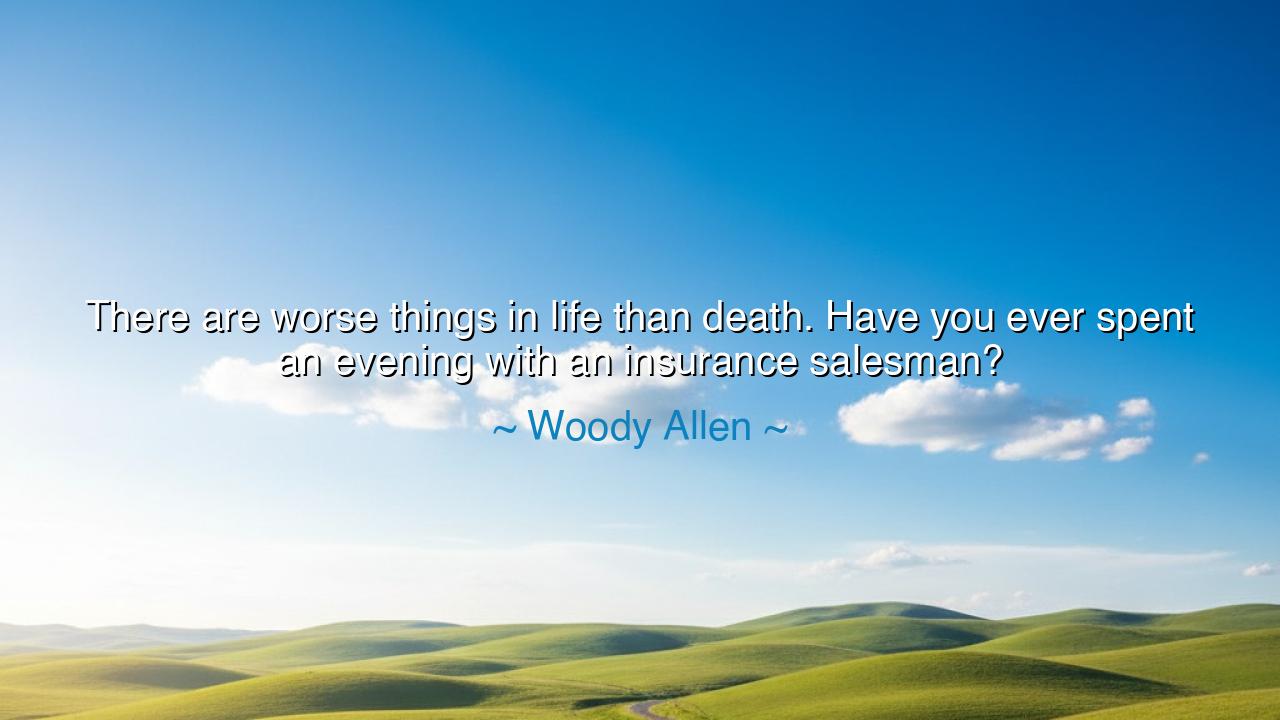
There are worse things in life than death. Have you ever spent an
There are worse things in life than death. Have you ever spent an evening with an insurance salesman?






“There are worse things in life than death. Have you ever spent an evening with an insurance salesman?” Thus spoke Woody Allen, a modern jester of our age, whose wit—though wrapped in laughter—often hides the weight of profound truth. Beneath the surface of this jest lies an observation as ancient as the human spirit: that suffering, boredom, and the slow decay of joy can sometimes feel heavier than death itself. It is a line of humor, yes, but also a line of wisdom—mocking not the salesman alone, but the weary patterns of life that make men mechanical, conversations empty, and days devoid of meaning.
In truth, Allen’s quip belongs to the long tradition of philosophical humor, that art of laughing at life’s tragedies to keep them from crushing the heart. The ancients too had their jesters and cynics who spoke truth through mockery. Diogenes of Sinope, the ragged philosopher who lived in a barrel, mocked the pomp and vanity of Athens by turning wisdom into satire. When Alexander the Great offered him anything he desired, Diogenes merely said, “Stand out of my sunlight.” In such moments, laughter becomes revelation. Woody Allen, in his own age, used the same craft—to remind us that even in a world of absurdity, humor can reveal what solemnity cannot.
To say there are worse things than death is not mere exaggeration. It is a reflection on the spiritual condition of modern life—the dull ache of routine, the endless chase for security, the loss of wonder. The insurance salesman becomes a symbol, not of a man, but of a system that reduces existence to numbers, risk, and profit. An evening spent in such company, Allen suggests, is not physically painful, but spiritually exhausting. It is the kind of weariness that drains the soul more than any mortal wound could. In this way, the quote points to a deeper ailment of civilization: the death of passion, the death of meaning, even while the body still lives.
Consider the story of Prince Siddhartha, the Buddha before his enlightenment. Surrounded by wealth, comfort, and pleasure, he realized one day that such a life was not truly living—it was a gilded prison. When he saw suffering, sickness, and death for the first time, he understood that comfort alone could not satisfy the spirit. He left his palace to seek truth, for he knew that to live without purpose is worse than to die with it. Like Allen’s jest, though spoken in jest, the lesson remains: to live without meaning is to endure a thousand small deaths before the final one.
And yet, Allen’s humor also carries mercy. His laughter does not condemn mankind; it frees it. For to laugh at our absurdity is to rise above it. Humor becomes a weapon of wisdom, a torch in the darkness of monotony. It teaches that even when life feels empty, the act of laughter itself is rebellion—a defiance of despair. The ancients too believed this: that laughter was sacred. Aristophanes, through comedy, moved nations to reflection. Seneca himself once said, “It is better to laugh at life than to weep over it.” For in laughter, one finds the strength to face the unbearable without surrender.
Thus, Allen’s jest may be read as a call to awaken from the dullness of modern existence. The insurance salesman—the endless talker of policies and percentages—reminds us how easily men become slaves to fear, trading their freedom for safety, their imagination for certainty. The wise, however, seek not the comfort of insurance but the courage of awareness. They remember that life, with all its risk, is the very thing that makes the soul grow. To hide from danger is to hide from meaning.
So, dear listener, learn from the philosopher disguised as a fool. When life grows dull, when your days feel like an endless negotiation, do not envy the salesman who speaks of safety—seek instead the poet who speaks of wonder. Death may end the body, but the death of spirit begins when we cease to live with passion, curiosity, and joy. Let humor be your shield against despair, and courage your answer to monotony. For indeed, as Woody Allen reminds us with a smirk and a sigh, there are worse things in life than death—to live without laughter, without purpose, without fire.
Therefore, laugh deeply, live boldly, and never let your spirit become an insurance policy for safety. For while death may end life, the absence of meaning ends it far sooner—and that, as both sage and jester agree, is the one fate worth fearing.






AAdministratorAdministrator
Welcome, honored guests. Please leave a comment, we will respond soon